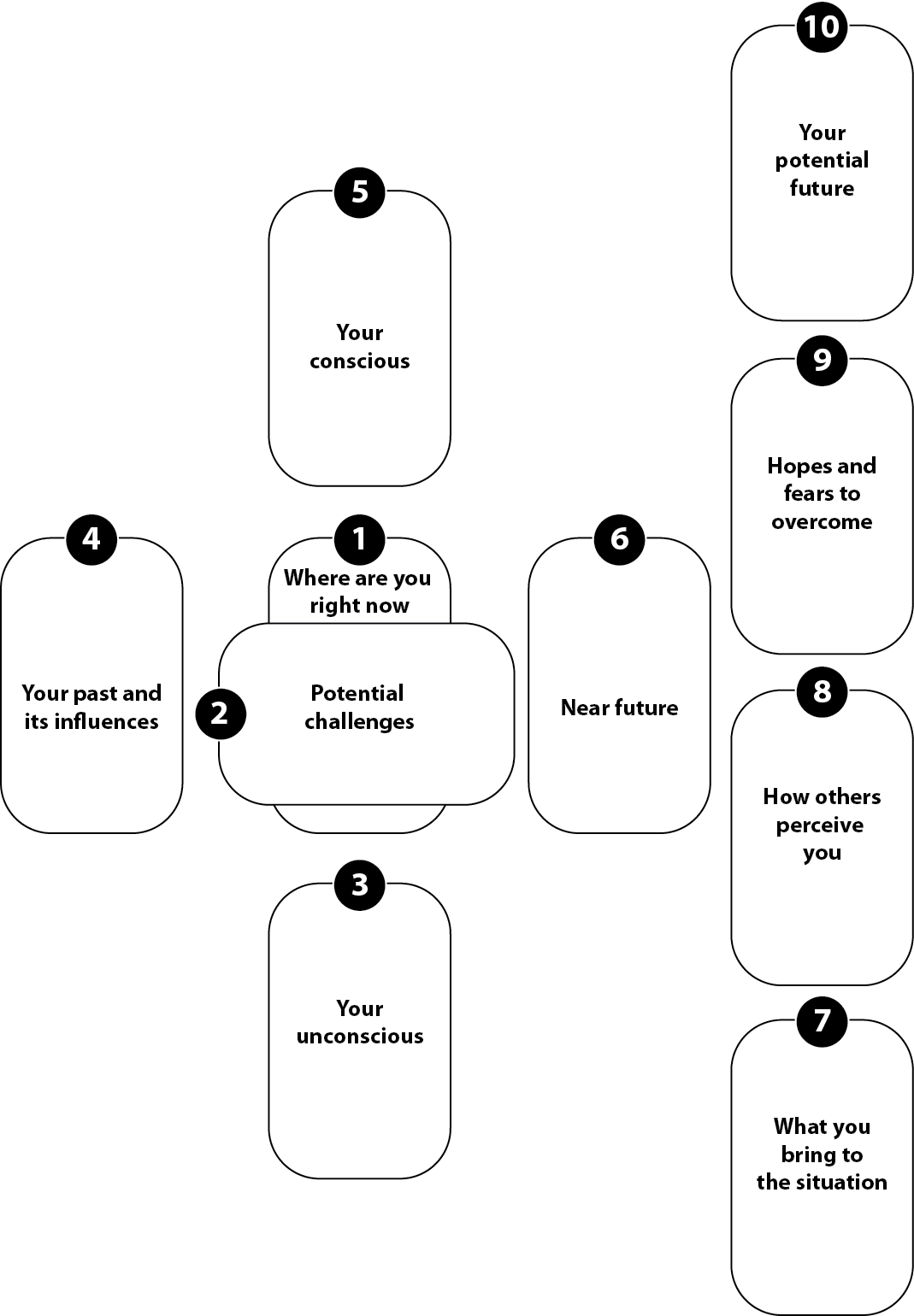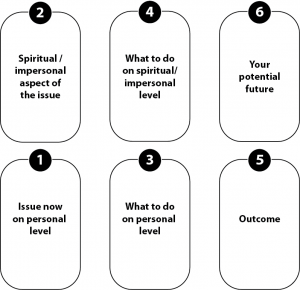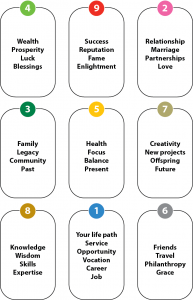There are many divination modalities, and in feng shui, some of the most popular divination techniques are I Ching, astrology, dowsing Tarot and so on.
What is divination?
Divination (from Latin divinare ‘to foresee, to be inspired by a god’, related to divinus, divine) is a mode of thinking to get insights into a question or situation using different divination methods such as I Ching, astrology, dowsing, tarot, runes, reading leaves or coffee, numerology and so on. I wonder if you can pretend you’ve never had precognitive and audacious thinking in your life and imagine what it is like to go through a typical day.
I Ching / Yijing: Book of Changes
I Ching is a Chinese method of divination and one of the oldest known Chinese philosophy texts and is composed of 64 hexagrams based on the combination of eight trigrams and is used in feng shui. Somebody wise said, “Be happy for all the time you don’t need, I Ching.” because if you do, you’re probably at a difficult time in your life.
“The Book of Changes is thought to be the oldest of the great Chinese classics and to date from perhaps as early as 1300 BCE. The book may also go back to the earliest phases of human thought because the I Ching is really the ground plan in the way in which not only the Chinese think, it’s almost a mapping of all the thinking processes of man.” The I Ching is the basis for polymath Gottfried Wilhelm Leibniz’s binary code and, consequently, the basis of our current digital technology. Psychologist Carl Jung used the Book of Changes to examine notions of synchronicity or ‘meaningful coincidence.’ Alan Watts considered the I Ching to be a conceptual model that charted the thinking processes of the human mind.
Alan Watts was aware of the fact that the system of arithmetic which is used by digital computers came from the I Ching, ie the binary code: “We have a binary system of arithmetic zero and one in varying arrangements. Digital computers use a number system which consists only of the figures zero and one, out of which you can construct any number and this was invented by Leibniz, who got it from the Book of Changes.”
Carl Jung used I Ching with his patients during therapy sessions. “… A certain curious principle that I have termed synchronicity, a concept that formulates a point of view diametrically opposed to that of causality. Since the latter is a merely statistical truth and not absolute, it is a sort of working hypothesis of how events evolve one out of another, whereas synchronicity takes the coincidence of events in space and time as meaning something more than mere chance.”
Dowsing
Dowsing is the ancient art of finding or gathering information. The principle behind it is that we can tap into any information field through our bodies and senses. Dowsing rods and pendulums are tools for externalising the intuitive responses that we have about people, situations and things.
Dowsing can be used for many things including:
- finding geopathic stress directly and over a distance from plans
- testing for feng shui problems and remedies
- locating underground water and minerals
- testing for allergies, etc
- locating lost people and objects
- evaluating present issues and solutions
Astrology
” Why do some people read horoscopes? Possibly because they want ‘someone’ to tell them what is going to happen. What about ‘designing’ what is going to happen?”
Edward De Bono
“People are constantly looking for explanations and striving to understand and make sense of their experiences, thoughts, and actions, as this makes us feel more in charge of our lives.” says Dr Jill Wilkinson, a senior psychologist at the University of Surrey. Whether it is I-ching, tarot or astrology some parts of ourselves want to be assured and want to know that we are going to be all right in the future.
“Giving up the need to know why things happen as they do are two of life’s greatest challenges. The hardcore truth is that we may never know why things happen as they do. Because we grow up with teachings about right and wrong, punishment and mercy, it is natural to fall into a pattern that seems to offer us a type of safety net, namely if we do not do anything wrong, nothing sad, bad, or undeserving will happen to us. Unfortunately, life is not that organised, and certainly, it does not script itself around our definition of fairness. Horrible things do happen. One woman spoke about her husband being murdered and how does she release that? Another woman wrote about coming to terms with the death of her daughter. ” Caroline Myss
‘Astrology is one of numerous valid worldviews available at the mythic level of consciousness, and it accomplishes a sense of connection to the cosmos and a role for the self in the vastness of the universe. It is not, however, a rational science with predictive power (which is why it has consistently failed empirical tests devised by astrologers themselves).
From the mythic level, we want to preserve the experience of belonging and the capacity for membership in a community. But within any level of reality, there are more valid and less valid views, as determined by the criteria for that level. Astrology is part of the mythic level, and there are good and bad astrologers. Although none of them have thus successfully passed any rational-empirical tests, that is not the actual criteria of the mythic level. The mythic level, like all levels, attempts to provide coherence, meaning, connection to the cosmos, care of others, and pragmatic guidelines. The mythological version of this (of which astrology is a subset) is an interpretive scheme that provides meaning, ethos, mythos, and sanction for the separate self at that level. Mythology and astrology speak to this level in all of us and when in touch with that level, provide a wonderful connection to our vital roots. Good astrologers do this in valid and worthy ways; bad astrologers do not (judged within that level). Of course, it is one thing to tap into that lover level, quite another to remain there (or to champion that lower level as if it were the ultimate level of reality). Those making higher claims for astrology, when they cannot be substantiated, are suspect in any case.
On the other hand, a rational scientist who despises every variety of mythology because it a lower level (and cannot pass rational-empirical tests) is simply someone out of touch with his or her roots. Integrated individuals are comfortable with all of the levels of reality as manifested in and through them, and can speak the languages of all chakras as various situations warrant. As always, it is only the exclusive attachment to any one (chakra) that causes most of the problems.’ – Ken Wilber
It appears astrology is a belief without corroborating evidence. What I see people yearning for, when turning to astrology, is a sense of connection to the cosmos. But they would do better to turn to the Kosmos. Thus is, instead of plugging into the gross dimensions of physical planets connected to their personal egos, let their awareness rise gently into the transpersonal realms. Not merely a horizontal connection to physical planets, but a vertical connection to soul and spirit, subtle and causal, ultimate and nondual. The spiritual impulse hidden in astrology and diverted onto the cosmos needs to be released into the Kosmos, released into that ultimate Embrace which holds the planets in the palm of its hand and spins galaxies in its stride. Not psyche and cosmos, but psyche and Kosmos, holds the secret to the connection long sought, – Ken Wilber
Books on astrology related to feng shui
Feng shui Astrology – Jon Sandifer, 0-7499-1709-1
The Ki – Takashi Yoshikawa, 0-312-02594-7
Nine Star Ki – Michio Kushi, 0-9628528-0-5
Astrology – Darby Costello, 0-7513-5449-X
Nine Star Ki – Bob Sachs, 1-85230-334-4
Secrets of Japanese Astrology – Takeo Mori, Dragan Milenkovic, 0-348-0290-2
Earth Medicine – Kenneth Meadows, 1-85230-117-1
On Divination and Synchronicity – Marie-Louise Von Franz, 0-919123-02-3
Chinese Numerology in Feng shui – Lilian Too, 983-9778-72-2
Feng shui & Destiny for Managers – Raymond Lo, 981-204-620-8
Feng shui and Destiny – Raymond Lo, 1-85646-026-6
A young man asked Winston Churchill what are the characteristics of becoming a politician. Churchill said, “It is the ability to foretell what is going to happen tomorrow, next week, next month and next year. And to have the ability afterwards to explain why it didn’t happen.”
Tarot
Tarot started as a popular, trump-based Renaissance card game in 15th-century Italy which is now a very popular tool for examining the present in relation to the past and future. Nowadays, tarot is popular as ever with over 61 billion views on TikTok. The common misconception about tarot divination is that it can predict the future. The main function of tarot is to gain clarity, and perspective about your life, resolve conflict or troubling issues as well as find patterns and narratives that influence you. The tarot is composed of 78 cards which are organised into 22 cards of Major Arcana which chart and symbolise the stages of your psychological and spiritual growth and 56 cards of Minor Arcana which cover subplots and give further insights. There are also four suits within Minor Arcana: cups represent your creativity and heart/emotions, swords relate to mind/ego, pentacles relate to the worldly needs/aspects such as body, food, accommodation and finances and wands relate to the levels of our energy needed to start new projects.
The tarot pack is a simple visual tool that can easily be reconciled with the 9 archetypical energies of the feng shui bagua. Using the tarot in feng shui will help to give you a quick, practical analysis of a situation. See the bagua tarot spread below.
When reading tarot, shuffle the cards with a question in mind. It might be useful to write it down beforehand to gain extra clarity and focus. There are different spreads for different scenarios and needs. Place the cards face down in your chosen spread or particular order. Turn the cards up and start connecting the meanings between them according to the spread matrix. If a card is reversed, ie upside down, it means that the energy of that pattern or archetype is blocked and you need to work on it, or you’re coming from fear as opposed to trust, truth and love. Reverse cards, metaphorically speaking suggests that you’re in the process of turning things around as long as you’re conscious about the issue and you’re willing to work on it. Some tarot readers don’t subscribe to reverse card meanings which potentially could be limiting.
Examples of tarot spreads
Celtic cross spread which suggests ways to move forward by looking at the present, past and future aspects.

Tarot spread for the current situation – Celtic cross spread

Simple tarot spread for an issue
Bagua tarot spread
You can use tarot cards to do a bagua-type spread for the current year. Ask, “What are opportunities and challenges for the current year that I need to be aware?” If you get a reverse card, it means that the energy of that aspect/house/gua is blocked and needs extra work or attention on an inner level and external, environmental, and feng shui level.

Tarot bagua spread for the year
Customised tarot spreads
You can make your own tarot spreads depending on your needs, creativity and preference. For example, you can make a tarot spread for your chakra system, starting from the root chakra and ending up with your 8th chakra with the intention of getting any insight into what’s going on on these levels. For your feng shui purposes, you can draw a tarot card for each room of your home or workplace.
“We can predict the future, when we know how the present moment evolved from the past.”
Carl Jung in 1933 lecture on synchronicity
Runes
Rune stones (or cards) are used as a divination tool. Rune stones come in a set of 24 ancient alphabetic symbols. Runes were originally an ancient Germanic alphabet used for writing and then for divination and magic. From about 100BCE to 1600CE, runes were used throughout northern Europe, Scandinavia, the British Isles and Iceland. Runic inscriptions have been found as well in North America, which suggests that the Vikings arrived in the Americas long before Columbus.
